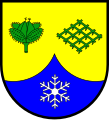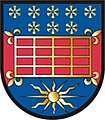The snowflake or snow crystal, is a charge in heraldry.
The display in coats of arms is following a strictly stylized form of the natural six pointed crystal form of a snowflake. In older heraldic literature, this charge is not to be seen. In modern heraldry, the snowflake is most used in northern Europe, in arms in Sweden, Norway and Finland, where it alludes to the meteorological features of the lands. Otherwise, it also is a symbol for winter, and together with the sun the changing seasons (e.g. In the arms of Bad Kleinkirchheim, Austria, ), or locally important winter sport (e.g. Saalbach-Hinterglemm, Austria, together with a pair of skis).
The tincture is often argent (silver).

Salzburg is an Austrian federal state. In German it is called a Bundesland, a German-to-English dictionary translates that to federal state and the European Commission calls it a province. In German, its official name is Land Salzburg, to distinguish it from its eponymous capital Salzburg. For centuries, it was an independent Prince-Bishopric of the Holy Roman Empire. It borders Germany and Italy.
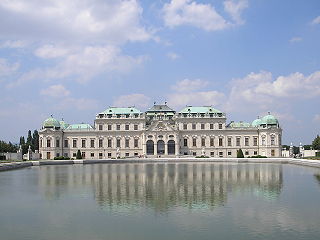
Tourism forms an important part of the economy of Austria, accounting for almost 9% of the Austrian gross domestic product. Austria has one guest bed for every six inhabitants, and boasts the highest per capita income from tourism in the Organisation for Economic Co-operation and Development. As of 2007, the total number of tourist overnight stays is roughly the same for summer and winter season, with peaks in February and July/August.

The Saalach is a 105-kilometre-long (65 mi) river in Austria and Germany, and a left tributary of the Salzach.
In heraldry, a charge is any emblem or device occupying the field of an escutcheon (shield). That may be a geometric design or a symbolic representation of a person, animal, plant, object, building, or other device. In French blazon, the ordinaries are called pièces, and other charges are called meubles.
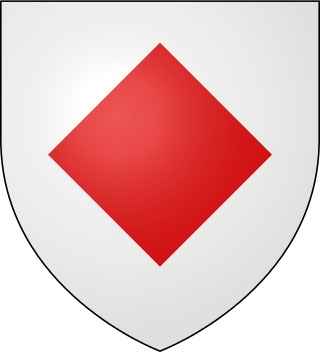
The lozenge in heraldry is a diamond-shaped rhombus charge, usually somewhat narrower than it is tall. It is to be distinguished in modern heraldry from the fusil, which is like the lozenge but narrower, though the distinction has not always been as fine and is not always observed even today. A mascle is a voided lozenge—that is, a lozenge with a lozenge-shaped hole in the middle—and the rarer rustre is a lozenge containing a circular hole in the centre. A lozenge throughout has "four corners touching the border of the escutcheon". A field covered in a pattern of lozenges is described as lozengy; similar fields of mascles are masculy, and fusils, fusily. In civic heraldry, a lozenge sable is often used in coal-mining communities to represent a lump of coal.

Ermine in heraldry is a fur, a type of tincture, consisting of a white background with a pattern of black shapes representing the winter coat of the stoat. The linings of medieval coronation cloaks and some other garments, usually reserved for use by high-ranking peers and royalty, were made by sewing many ermine furs together to produce a luxurious white fur with patterns of hanging black-tipped tails. Due largely to the association of the ermine fur with the linings of coronation cloaks, crowns and peerage caps, the heraldic tincture of ermine was usually reserved to similar applications in heraldry. In heraldry it has become especially associated with the Duchy of Brittany and Breton heraldry.
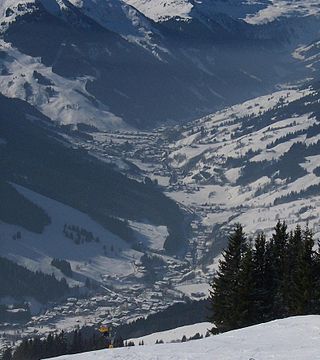
Saalbach-Hinterglemm is a municipality in the district of Zell am See, in the Austrian state of Salzburg. It is well known for its skiing and other winter sports. A four-piste network consisting of Saalbach, Hinterglemm, Fieberbrunn and Leogang is located in the municipality, adding up to 270 kilometres (170 mi) of ski slopes. It is short transfer to resort from Salzburg Airport.
In heraldry and heraldic vexillology, a blazon is a formal description of a coat of arms, flag or similar emblem, from which the reader can reconstruct the appropriate image. The verb to blazon means to create such a description. The visual depiction of a coat of arms or flag has traditionally had considerable latitude in design, but a verbal blazon specifies the essentially distinctive elements. A coat of arms or flag is therefore primarily defined not by a picture but rather by the wording of its blazon. Blazon is also the specialized language in which a blazon is written, and, as a verb, the act of writing such a description. Blazonry is the art, craft or practice of creating a blazon. The language employed in blazonry has its own vocabulary and syntax, which becomes essential for comprehension when blazoning a complex coat of arms.
The FIS Alpine World Ski Championships 1991 were held in Saalbach-Hinterglemm, Austria between 22 January and 3 February, 1991.

Ingrid Salvenmoser is a former alpine skier from Austria. Her ski career in the Austrian National Ski Team started in the 1983/84 season and she debuted in the World Cup in the 1984/85 season. In total she took part in 196 World Cup races in Giant Slalom and Slalom. She was three times ranked top 3 and several times top 10.
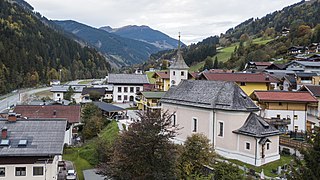
Viehhofen is a municipality in the district of Zell am See, in the state of Salzburg in Austria.
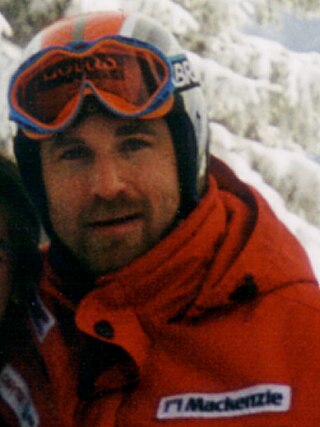
Edward "Ed" Charles Podivinsky is a Canadian alpine skier who competed in the 1994 Winter Olympics, 1998 Winter Olympics, and 2002 Winter Olympics. He was member of the 1992 Canadian Olympic (Albertville) team. He was injured in his last training run for the men's downhill event.

A snowflake is a single ice crystal that is large enough to fall through the Earth's atmosphere as snow. Snow appears white in color despite being made of clear ice. This is because the many small crystal facets of the snowflakes scatter the sunlight between them.

The Glemmtal in the Austrian state of Salzburg is the valley of the roughly 30 km long upper reaches of the River Saalach. It belongs to the northern Pinzgau region and separates the Kitzbühel Alps in an east-west direction. Its main settlement is the village of Saalbach in Zell am See district.

The Schattberg is a 2,097 m (AA) high mountain in the Kitzbühel Alps in the Austrian state of Salzburg.
The Skicircus Saalbach Hinterglemm Leogang Fieberbrunn is a winter sports area in the Austrian federal state of Salzburg. It extends on both sides of the valley over the mountains of the Glemmtal and has a link to Leogang and to Fieberbrunn, in Tyrol. Because the area is laid out around the valley and the municipality of Saalbach-Hinterglemm the name "Skicircus" was chosen. A ski circus is a winter sports area that is laid out around a valley, normally enabling circuits of the whole complex.

The 49th World Cup season began on 25 October 2014, in Sölden, Austria, and concluded on 22 March 2015 at the World Cup finals in Meribel, France. The defending overall champions from the 2014 season - Marcel Hirscher and Anna Fenninger, both of Austria, defended their titles successfully. The season was interrupted by the World Championships in February, in the United States at Vail/Beaver Creek, Colorado. Combined events were not awarded as a discipline trophy.

The International Ski Federation (FIS) Alpine Ski World Cup was the premier circuit for alpine skiing competition. The inaugural season launched in January 1967, and the 2018–19 season marks the 53rd consecutive year for the FIS World Cup.
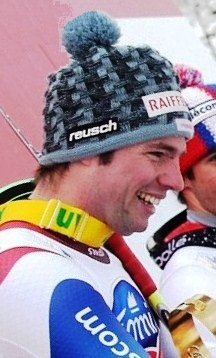
The men's downhill in the 2021 FIS Alpine Skiing World Cup consisted of seven events. The original schedule had contained nine downhills, but a rescheduled one on 5 March in Saalbach-Hinterglemm, Austria, was canceled due to fog and continual snowfall after just nine skiers had finished, and the downhill during World Cup finals week was also canceled.
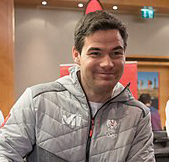
The men's super-G in the 2021 FIS Alpine Skiing World Cup consisted of six events, although seven had been originally scheduled.




